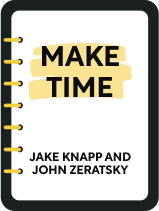

This article is an excerpt from the Shortform book guide to "Make Time" by Jake Knapp and John Zeratsky. Shortform has the world's best summaries and analyses of books you should be reading.
Like this article? Sign up for a free trial here .
How do you make routine tasks? What is the benefit of doing a specific task every day?
In Make Time, Jake Knapp and John Zeratsky suggest that the most important step to reclaiming control and being proactive with your time is to choose one task to be your “Focus” each day. Your Focus will be a single task or project that will take 60-90 minutes to complete.
Continue reading to learn how to make an important task part of your routine.
Be Practical About Your Focus
It may seem like the act of picking a routine task is just one more thing added to your already overburdened to-do list. In response, the authors offer several ideas to help establish your Focus as part of your routine.
First, write your Focus down every day. It doesn’t have to be a new one; if you’re working on an extended project, you might repeat your Focus for as long as you have to.
(Shortform note: Repetition is a valuable tool for learning skills, forming habits, and reducing stress. However, as with anything, it also has an unhealthy side. Repetition can act as a crutch and can prevent you from making a necessary change. It’s important to remember that sometimes repeating your Focus is beneficial, and other times you need to mix things up.)
Knapp and Zeratsky emphasize the importance of determining whether you function better in the morning, afternoon, or evening, and scheduling your Focus for that time. For some people, the early morning is when they’re able to concentrate best. For others, late at night is the only time when they’re able to eliminate distractions. The classic example is the “writer with a day job” who is only able to work on their own projects when the rest of their family is asleep.
If you feel like you’re lagging on several small projects, you can group them all into one big Focus: “getting caught up.” However, such activities are more reactive than proactive and not particularly motivating. Normally, you’ll want your Focus to be something to which you’re eager to give your full attention.
Early Risers vs. Night Owls
Science has shown that “morning people” and “night people” have different circadian rhythms, called chronotypes. These differences affect personality traits, peak energy times, and even a predisposition to certain health problems. However, sleep researcher Kristen Knutson points out that many of the challenges faced by “night owls” are because modern society favors those whose energy peaks in the morning.
For optimal living, it’s important to know how your own body functions throughout the day and to schedule your activities accordingly.
Getting in the Flow
If you can hone your attention on one particular Focus and avoid interruptions that might distract you from it, you may find that you become so engrossed in what you’re doing that you enter a state of optimal creativity—a time in which all your energy pours freely into your goal. You may even lose the sense of how much time is passing. Hungarian psychologist Mihaly Csikszentmihalyi defines this experience as flow.
Csikszentmihalyi explains that when you enter a state of flow, you experience true enjoyment, control over your feelings, and a greater sense of purpose and meaning. The key to achieving flow is identifying what specific Focus activities are best suited for your values and lifestyle, whether through exercise, work, or personal relationships.

———End of Preview———
Like what you just read? Read the rest of the world's best book summary and analysis of Jake Knapp and John Zeratsky's "Make Time" at Shortform .
Here's what you'll find in our full Make Time summary :
- How the current landscape is designed to steal your time and attention
- How to be proactive to take back your time
- Why we were all better off as hunter-gatherers






